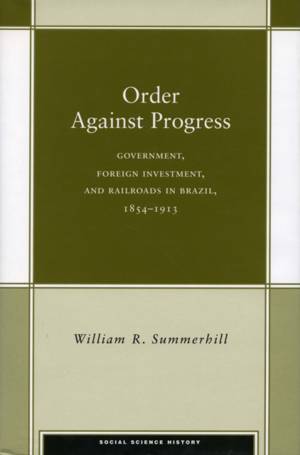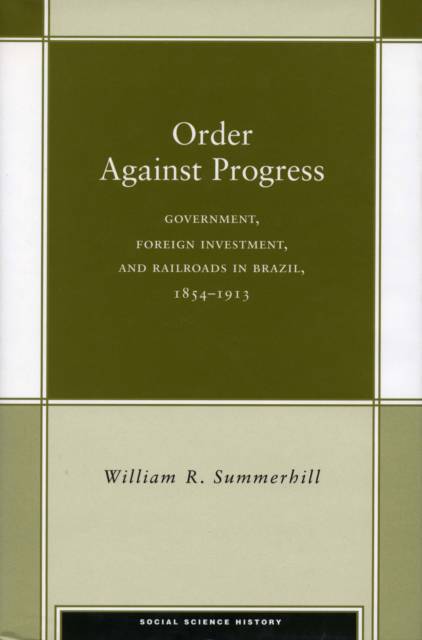
- Afhalen na 1 uur in een winkel met voorraad
- Gratis thuislevering in België vanaf € 30
- Ruim aanbod met 7 miljoen producten
- Afhalen na 1 uur in een winkel met voorraad
- Gratis thuislevering in België vanaf € 30
- Ruim aanbod met 7 miljoen producten
Order Against Progress
Government, Foreign Investment, and Railroads in Brazil, 1854-1913
William R SummerhillOmschrijving
How did foreign investment in infrastructure affect a relatively backward Latin American economy? The author engages this long-standing issue in Latin American history by applying the methods of the "new economic history" to the study of Brazilian railway development.
Railroads have long been viewed as having intensified Brazil's dependence on foreign product and capital markets in the second half of the nineteenth century. Because steam locomotion in Brazil relied heavily on British finance in an age of export-led economic growth, many scholars have viewed railroads as magnifying economic dependency in ways that benefited foreign investors and export agriculture at the expense of the Brazilian economy as a whole.
This study combines extensive archival research in Brazil and Britain with cliometric methods to present a new and provocative picture of the impact of railroads on the Brazilian economy. The book's findings reveal that the savings on transport costs provided by the railroad accounted for a large share of the Brazilian economy's gains before 1914. Indeed, thanks largely to the savings generated by railroad investments, in the early twentieth century Brazil emerged from decades of stagnation to become one of the Western world's fastest growing economies. Moreover, foreign investors in Brazilian railroads failed to reap profits commensurate with the benefits their investments produced within Brazil: government policies on subsidy and regulation enabled Brazil to capture and retain most of the gains resulting from transport improvements.
Combined with other significant changes of the era, railroad development favored immigration, the expansion of agriculture, and the growth of manufacturing in an economy that had long been laggard. In addition to drawing substantive conclusions about the Brazilian case, this book demonstrates that the techniques of the new economic history provide Latin American specialists with a rich array of tools to identify and assess the various consequences of technological and institutional change in historical perspective.
Specificaties
Betrokkenen
- Auteur(s):
- Uitgeverij:
Inhoud
- Aantal bladzijden:
- 320
- Taal:
- Engels
- Reeks:
Eigenschappen
- Productcode (EAN):
- 9780804732246
- Verschijningsdatum:
- 25/08/2003
- Uitvoering:
- Hardcover
- Formaat:
- Genaaid
- Afmetingen:
- 156 mm x 237 mm
- Gewicht:
- 566 g

Alleen bij Standaard Boekhandel
Beoordelingen
We publiceren alleen reviews die voldoen aan de voorwaarden voor reviews. Bekijk onze voorwaarden voor reviews.











